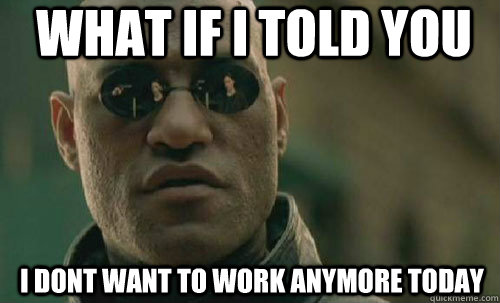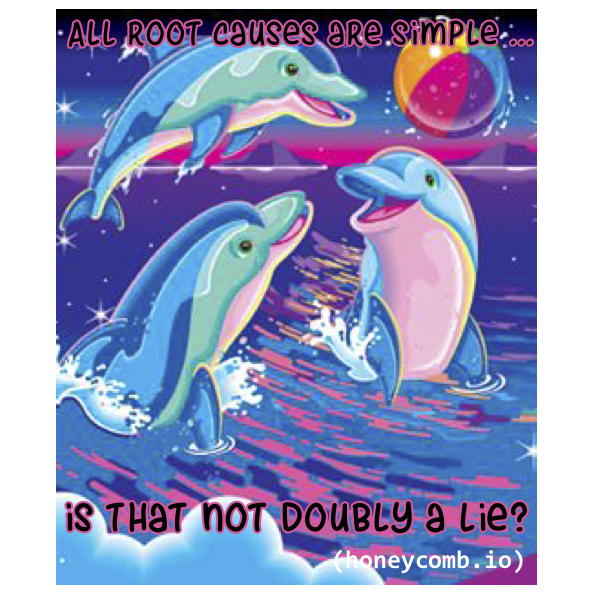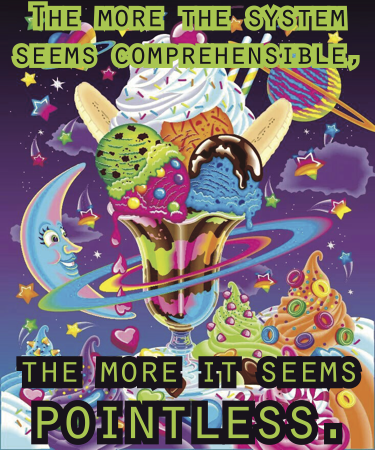Last night I was out with a dear friend who has been an engineering manager for a year now, and by two drinks in I was rattling off a long list things I always say to newer engineering managers.
昨晚,我和一个做了一年工程经理的好朋友出去玩,喝了两杯酒,我就开始滔滔不绝地说我经常对新来的工程经理说的话。
Then I remembered: I should write a post! It’s one of my goals this year to write more long form instead of just twittering off into the abyss.

然后我想起:我应该写一篇文章!我今年的目标之一是写更多的长篇,而不仅仅是在深渊中喋喋不休。
There’s a piece I wrote two years ago, The Engineer/Manager Pendulum, which is probably my all time favorite. It was a love letter to a friend who I desperately wanted to see go back to engineering, for his own happiness and mental health. Well, this piece is a sequel to that one.
两年前我写过一篇文章,《工程师/经理的钟摆》, 这可能是我一直以来的最爱 这是一封写给一个朋友的情书,我非常希望看到他回到工程师的岗位,为了他自己的幸福和心理健康。 这部作品是那部的续集。
It’s primarily aimed at new managers, who aren’t sure what their career options look like or how to evaluate the opportunities that come their way, or how it may expand or shrink their future opportunities.
它主要针对新的管理者,他们不确定自己的职业选择是什么样的,或者如何评估出现在他们面前的机会,或者它如何扩大或缩小他们未来的机会。
THE FIRST FORK IN THE MANAGER’S PATH
管理者道路上的第一个岔路口
Every manager reaches a point where they need to choose: do they want to manage engineers (a “line manager”), or do they want to try to climb the org chart? — manage managers, managers of other managers, even other divisions; while

每一位管理者都会面临一个选择:他们是想管理工程师(一个“直线经理”),还是想试图爬上组织结构图?- 管理经理,其他经理的经理,甚至其他部门;同时being “promoted” from manager to senior manager, director to senior director, all the way up to VP and so forth. Almost everyone’s instinct is to say “climb the org chart”, but we’ll talk about why you should be critical of this instinct.
从经理“晋升”到高级经理,从总监“晋升”到高级总监,一直到副总裁等等。 几乎每个人的本能都是说“爬上组织结构图”,但我们将讨论为什么你应该对这种本能持批评态度。
They also face a closely related question: how technical do they wish to stay, and how badly do they care?
他们还面临一个密切相关的问题:他们有多希望留在技术上,他们有多在乎?
Are you an “engineering MANAGER” or an “ENGINEERING manager”?
你是“工程经理”还是“工程经理”?
These are not unlike the decisions every engineer ends up making about whether to go deep or go broad, whether to specialize or be a generalist. The problem is that both engineers and managers often make these career choices with very little information — or even awareness that they are doing it.
这与每个工程师最终做出的决定没有什么不同,这些决定是深入还是广泛,是专业化还是成为通才。 问题在于,工程师和管理者在做出这些职业选择时,往往信息很少,甚至没有意识到自己在做这件事。
And managers in particular then have a tendency to look up ten years later and realize that those choices, witting or unwitting, have made them a) less employable and b) deeply unhappy.
尤其是管理者,他们往往会在十年后抬起头来,意识到那些选择,无论是有意还是无意,都使他们a)不太适合就业,b)非常不快乐。
Lots of people have the mindset that once they become an engineering manager, they should just go from gig to gig as an engineering manager who manages other engineers: that’s who they are now. But this is actually a very fragile place to sit long-term, as we’ll discuss further on in this piece.
很多人都有这样的心态,一旦他们成为工程经理,他们就应该作为一个管理其他工程师的工程经理从一个工作岗位到另一个工作岗位:他们现在就是这样 但这实际上是一个非常脆弱的地方坐在长期,因为我们将在这篇文章中进一步讨论。
But let’s start at to the beginning, so I can speak to those of you who are considering management for the very first time.
但是让我们从头开始,这样我就可以和你们中那些第一次考虑管理的人谈谈。
“SO YOU WANT TO TRY ENGINEERING MANAGEMENT.”
“所以你想试试工程管理。”
COOL! I think lots of senior engineers should try management, maybe even most senior engineers. It’s so good for you, it makes you better at your job. (If you aren’t a senior engineer, and by that I mean at least 7+ years of engineering experience, be very wary; know this isn’t usually in your best interest.)
酷!我认为很多高级工程师应该尝试管理,甚至是大多数高级工程师。 这对你有好处,能让你更好地工作. (If你不是一个高级工程师,我的意思是至少7年以上的工程经验,要非常谨慎;我知道这通常不符合你的最佳利益。
Hopefully you have already gathered that management is a career change, not a promotion, and you’re aware that nobody is very good at it when they first start.
希望你已经知道管理是一种职业转变,而不是晋升,你知道没有人在刚开始的时候是非常擅长的。
That’s okay! It takes a solid year or two to find new rhythms and reward mechanisms before you can even begin to find your own voice or trust your judgment. Management problems look easy, deceptively so. Reasons this is hard include:
没关系!在你开始找到自己的声音或相信自己的判断之前,你需要一年或两年的时间来找到新的节奏和奖励机制。管理问题看起来很容易,但实际上是如此。 这很难的原因包括:
- Most tech companies are absolutely abysmal at providing any sort of training or structure to help you learn the ropes and find your feet.
大多数科技公司在提供任何形式的培训或结构来帮助你学习绳索和找到你的脚方面都是非常糟糕的。 -
Even if they do, you still have to own your own career development. If learning to be a good engineer was sort of like getting your bachelor’s, learning to be a good manager is like getting your PhD — much more custom to who you are.
即使他们这样做,你仍然必须拥有自己的职业发展。 如果说学习成为一名优秀的工程师有点像获得学士学位,那么学习成为一名优秀的管理者就像获得博士学位--这更符合你的个性。 - It will exhaust you mentally and emotionally in the weirdest ways for much longer than you think it should. You’ll be tired a lot, and you’ll miss feeling like you’re good at something (anything).
它会以最奇怪的方式让你在精神上和情感上精疲力竭,时间比你想象的要长得多。 你会很累,你会想念你擅长某事(任何事情)的感觉。
This is because you need to change your habits and practices, which in turn will actually change who you are. This takes time. Which is why …
这是因为你需要改变你的习惯和做法,这反过来又会改变你是谁。 这需要时间 所以...
THE MINIMUM TOUR OF DUTY AS A NEW MANAGER IS TWO YEARS.
作为一个新的经理,最低的任期是两年。
If you really want to try being a manager, and the opportunity presents itself, do it! But only if you are prepared to fully commit to a two year long experiment.
如果你真的想尝试成为一名经理,机会就在眼前,去做吧! 但前提是你准备好完全投入到为期两年的实验中。

Commit to it like a proper career change. Seek out new peers, find new heroes. Bring fresh eyes and a beginner’s mindset. Ask lots of questions. Re-examine every one of your patterns and habits and priorities: do they still serve you? your team?
把它当作一个适当的职业转变。寻找新的同伴,寻找新的英雄。带来新鲜的眼光和初学者的心态。问很多问题。重新审视你的每一个模式、习惯和优先事项:他们还为您服务吗?你的团队
Don’t even bother thinking about in terms of whether you “enjoy managing” for a while, or trying to figure out if you are are any good at it. Of course you aren’t any good at it yet. And even if you are, you don’t know how to recognize when you’ve succeeded at something, and you haven’t yet connected your brain’s reward systems to your successes. A long stretch of time without satisfying brain drugs is just the price of admission if you want to earn these experiences, sadly.
甚至不要费心去想你是否“喜欢管理”一段时间,或者试图弄清楚你是否擅长管理。当然你还不擅长。 即使你是,你也不知道如何识别你在某件事上的成功,你还没有把你大脑的奖励系统与你的成功联系起来。 很长一段时间没有令人满意的大脑药物只是入场的价格,如果你想获得这些经验,可悲的是。
It takes more than one year to learn management skills and wire up your brain to like it. If you are waffling over the two year commitment, maybe now is not the time. Switching managers too frequently is disruptive to the team, and it’s not fair to make them report to someone who would rather be doing something else or isn’t trying their ass off.
学习管理技巧并让你的大脑喜欢上它需要一年多的时间。如果你对两年的承诺犹豫不决,也许现在不是时候。 过于频繁地更换经理会破坏团队,让他们向宁愿做其他事情或不努力工作的人报告是不公平的。
IT TAKES ABOUT 3-5 YEARS FOR YOUR SKILLS TO DETERIORATE.
你的技术需要3-5年才会退化。
So you’ve been managing a team for a couple years, and it’s starting to feel … comfortable? Hey, you’re pretty good at this! Yay!
所以你已经管理一个团队好几年了,开始感觉到…舒服吗 嘿,你很擅长这个! 耶!
With a couple of years under your belt as a line manager, you now have TWO powerful skill sets. You can build things, AND you can organize people into teams to build even bigger things. Right now, both sets are sharp. You could return to engineering pretty easily, or keep on as a manager — your choice.
作为一名直线经理,你已经有了几年的时间,现在你已经拥有了两套强大的技能。 你可以建造东西,你可以把人们组织成团队来建造更大的东西。现在,两套都很锋利。 你可以很容易地回到工程师岗位,或者继续做经理--你自己的选择。
But this state of grace doesn’t last very long. Your technical skills stop advancing when you become a manager, and instead begin eroding. Two years in, you aren’t the effective tech lead you once were; your information is out of date and full of gaps, the hard parts are led by other people these days.
但这种优雅的状态不会持续很长时间。当你成为一名经理时,你的技术技能停止了进步,反而开始侵蚀。 两年过去了,你不再是曾经的高效技术主管;你的信息已经过时了,而且充满了漏洞,现在最难的部分都被别人领导了。
More critically, your patterns of mind and habits shift over time, and become those of a manager, not an engineer. Consider how excited an engineer becomes at the prospect of a justifiable greenfield project; now compare to her manager’s glum reaction as she instinctively winces at having to plan for something so reprehensibly unpredictable and difficult to estimate. It takes time to rewire yourself back.
更重要的是,你的思维模式和习惯会随着时间的推移而改变,成为管理者,而不是工程师。 想想一个工程师在一个合理的格林菲尔德项目的前景时是多么兴奋;相比之下,她的经理的忧郁反应,她本能地畏缩在不得不计划的东西,如此不可预测和难以估计。 你需要时间来重新连接自己。
If you like engineering management, your tendency is to go “cool, now I’m a manager”, and move from job to job as an engineering manager, managing team after team of engineers. But this is a trap. It is not a sound long term plan. It leads too many people off to a place they never wanted to end up: technically sidelined.
如果你喜欢工程管理,你的倾向是“酷,现在我是一个经理”,从一个工程经理的工作到另一个工程经理的工作,管理一个又一个工程师团队。 但这是个陷阱。 这不是一个健全的长期计划。 它把太多的人带到了一个他们从来不想去的地方:严格来说是边缘人

WHY CAN’T I JUST MAKE A CAREER OUT OF BEING A COMBO TECH LEAD+LINE MANAGER?
为什么我不能从技术主管+生产线经理的组合中获得职业发展?
One of the most common paths to management is this: you’re a tech lead, you’re directing ever larger chunks of technical work, doing 1x1s and picking up some of the people stuff, when your boss asks if you’d like to manage the team. “Sure!”, you say, and voila — you are an engineering manager with deep domain expertise.
最常见的管理路径之一是:你是一个技术领导,你在指导越来越多的技术工作,做1x 1 s,并拿起一些人的东西,当你的老板问你是否愿意管理团队。 “当然可以!”,你说,瞧-你是一个工程经理,具有深厚的领域专业知识。
But if you are doing your job, you begin the process of divesting yourself of technical leadership responsibilities starting immediately. Your own technical development should screech to a halt once you become a manager, because you have a whole new career to focus on learning.
但是如果你在做你的工作,你就开始了从技术领导责任中剥离自己的过程。 一旦你成为一名经理,你自己的技术发展就应该戛然而止,因为你有一个全新的职业需要专注于学习。
Your job is to leverage that technical expertise to grow your engineers into great senior engineers and tech leads themselves. Your job is not to hog the glory and squat on the hard problems yourself, it’s to empower and challenge and guide your team. Don’t suck up all the oxygen: you’ll stunt the growth of your team.
你的工作是利用这些技术专长将你的工程师成长为伟大的高级工程师和技术领导。 你的工作不是独揽荣耀,自己解决难题,而是授权、挑战和指导你的团队。 不要吸光所有的氧气:你会阻碍你的团队成长
But your technical knowledge gets dated, and your skills atrophy.. The longer it’s been since you worked as an engineer, the harder it will be to switch back. It gets real hard around three years, and five years seems like a tipping point.[1]
但是你的技术知识过时了,你的技能萎缩了。 你离开工程师岗位的时间越长,就越难再回来。 三年左右会真实的艰难,五年似乎是一个转折点。【1】
And because so much of your credibility and effectiveness as an engineering leader comes from your expertise in the technology that your team uses every day, ultimately you will be no longer capable of technical leadership, only people management.
而且,作为一名工程领导者,你的可信度和效率很大程度上来自于你对团队每天使用的技术的专业知识,最终你将不再具备技术领导能力,而只能进行人员管理。
ON BEING AN “ENGINEERING MANAGER” WHO ONLY DOES PEOPLE MANAGEMENT
做一个只做人的“工程经理”
I mean, there’s a reason we don’t lure good people managers away from Starbucks to run engineering teams. It’s the intersection and juxtaposition of skill sets that gives engineering managers such outsize impact.
我的意思是,我们不把优秀的人事经理从星巴克吸引到工程团队是有原因的。 正是这些技能的交叉和并列,赋予了工程经理如此巨大的影响力。
The great ones can make a large team thrum with energy. The great ones can break down a massive project into projects that challenge (but do not overwhelm) a dozen or more engineers, from new grads to grizzled veterans, pushing everyone to grow. The great ones can look ahead and guess which rocks you are going to die on if you don’t work to avoid them right now.
伟大的球员可以让一个庞大的团队充满活力。 伟大的人可以把一个大项目分解成挑战(但不会压倒)十几个或更多工程师的项目,从应届毕业生到头发花白的老兵,推动每个人成长。 伟大的人可以向前看,猜到如果你现在不努力避开他们,你会死在哪块石头上。
The great ones are a treasure: and they are rare. And in order to stay great, they regularly need to go back to the well to refresh their own hands-on technical abilities.
伟大的人是一个宝藏:而且很罕见 为了保持出色,他们需要定期回到油井,以刷新自己的动手技术能力。

There is an enormous demand for technical engineering leaders — far more demand than supply. The most common hackaround is to pair a people manager (who can speak the language and knows the concepts, but stopped engineering ages ago) with a tech lead, and make them collaborate to co-lead the team. This unwieldy setup often works pretty well.
对技术工程领导者的需求巨大-远远超过供应。 最常见的变通方法是将一位人事经理(他会说这种语言,知道这些概念,但很久以前就停止了工程)与一位技术主管配对,让他们合作共同领导团队。 这种笨拙的设置通常工作得很好。
But most of those people managers didn’t want or expect to end up sidelined in this way when they were told to stop engineering.
但是,当他们被告知停止工程设计时,这些人中的大多数经理都不希望或不希望以这种方式结束。
If you want to be a pure people manager and not do engineering work, and don’t want to climb the ladder or can’t find a ladder to climb, more power to you. I don’t know that I’ve met many of these people in my life. I have met a lot of people in this situation by accident, and they are always kinda angsty and unhappy about it. Don’t let yourself become this person by accident. Please.
如果你想做一个纯粹的人事经理,而不是做工程工作,不想爬梯子或找不到梯子爬,你就有更多的权力。 我不知道我在我的生活中遇到过多少这样的人。 我偶然遇到过很多处于这种情况的人,他们总是有点焦虑和不高兴。不要让自己意外地成为这样的人。 拜托了
Which brings me to my next point.
这就引出了我的下一个观点。
YOU WILL BE ADVISED TO STOP WRITING CODE OR ENGINEERING.
您将被建议停止编写代码或工程。
✨
FUCK
THAT.
✨
Everybody’s favorite hobby is hassling new managers about whether or not they’ve stopped writing code yet, and not letting up until they say that they have. This is a terrible, horrible, no-good VERY bad idea that seems like it must originally have been a botched repeating of the correct advice, which is:
每个人最大的爱好就是和新上任的管理者争论他们是否已经停止编写代码,直到他们说他们已经停止编写代码。 这是一个可怕的,可怕的,没有好的非常糟糕的想法,似乎它最初一定是对正确建议的拙劣重复,这是:
STOP WRITING CODE AND ENGINEERING
停止编写代码和工程IN THE CRITICAL PATH 在关键的道路上
Can you spot the difference? It’s very subtle. Let’s run a quick test:
你能看出区别吗? 很微妙的。 让我们运行一个快速测试:
- Authoring a feature? ⛔️ 创作一个功能? ⛔️
- Covering on-call when someone needs a break? ✅
当有人需要休息的时候,值班? ✅ - Diving on the biggest project after a post mortem? ⛔️
最大的项目都是在事后调查后才开始的? ⛔️ - Code reviews? ✅ 代码审查? ✅
- Picking up a p2 bug that’s annoying but never seems to become top priority? ✅
拿起一个p2的错误,这是恼人的,但似乎从来没有成为首要任务? ✅ - Insisting that all commits be gated on their approval? ⛔️
坚持所有的提交都要经过他们的批准? ⛔️ - Cleaning up the monitoring checks and writing a library to generate coverage? ✅
清理监控检查并编写一个库来生成覆盖率? ✅
The more you can keep your hands warm, the more effective you will be as a coach and a leader. You’ll have a richer instinct for what people need and want from you and each other, which will help you keep a light touch. You will write better reviews and resolve technical disputes with more authority. You will also slow the erosion and geriatric creep of your own technical chops.
你越能让你的手保持温暖,你作为教练和领导者的效率就越高。 你会有一个更丰富的本能,人们需要什么,希望从你和对方,这将有助于你保持一个轻接触。 你会写更好的评论,并以更权威的方式解决技术纠纷。 你也会减缓你自己的技术印章的侵蚀和老年蠕变。
I firmly believe every line manager should either be in the on call rotation or pinch hit liberally and regularly, but that’s a different post.
我坚信每一位直线经理都应该在随叫随到的轮换中,或者自由地、定期地进行临时打击,但这是一个不同的职位。
TECHNICAL LEADERSHIP TRACK 技术领导力跟踪
If you love technology and want to remain a subject-matter expert in designing, building and shipping cutting-edge technical products and systems, you cannot afford to let yourself drift too far or too long away from hands-on engineering work. You need to consciously cultivate your path , probably by practicing some form of the engineer/manager pendulum.
如果你热爱技术,并希望在设计、构建和交付尖端技术产品和系统方面保持主题专家的地位,你就不能让自己远离或长期远离实际的工程工作。 你需要有意识地培养你的道路,可能是通过实践某种形式的工程师/经理钟摆。
If you love managing engineers — if being a technical leader is a part of your identity that you take great pride in, then you must keep up your technical skills and periodically

如果你喜欢管理工程师--如果作为一名技术领导者是你身份的一部分,你对此感到非常自豪,那么你必须保持你的技术技能,并定期invest in your practice and renew your education. Again: this is simply the price of admission. You need to renew your technical abilities, your habits of mind, and your visceral senses around creating and maintaining systems. There is no way to do this besides doing it. If management isn’t a promotion, then returning to hands-on work isn’t a demotion, either. Right?
投资于您的实践并更新您的教育。 再说一遍:这只是入场的代价。 你需要更新你的技术能力、思维习惯以及你在创建和维护系统方面的直觉。 除了做,没有别的办法。如果管理不是晋升,那么回到实际工作中也不是降级。 对吧?
One warning: Your company may be great, but it doesn’t exist for your benefit. You and only you can decide what your needs are and advocate for them. Remember that next time your boss tries to guilt you into staying on as manager because you’re so badly needed, when you can feel your skills getting rusty and your effectiveness dwindling. You owe it to yourself to figure out what makes you happy and build a portfolio of experiences that liberate you to do what you love. Don’t sacrifice your happiness at the altar of any company. There are always other companies.
一个警告:你的公司可能很棒,但它不是为了你的利益而存在的。 只有你自己才能决定你的需求是什么,并为之辩护。 记住,下一次你的老板试图让你内疚,让你继续做经理,因为你是如此的需要,当你感觉到你的技能生锈了,你的效率下降了。 你有责任自己找出什么让你快乐,并建立一个经验组合,解放你做你喜欢的事情。 不要在任何公司的祭坛上牺牲你的幸福。 总是有其他公司。
Honestly, I would try not to think of yourself as a manager at all: you are an “engineering leader” performing a tour of duty in management. You’re pursuing a long term strategy towards being a well-respected technologist, someone who can sling code, give informed technical guidance and explain in detail customized for to anyone at any level of sophistication.
老实说,我会尽量不把自己当作一个经理:你是一个“工程领导”,履行管理职责。 你正在追求一个长期的战略,成为一个受人尊敬的技术专家,一个可以抛出代码,给予明智的技术指导,并为任何复杂程度的人详细解释定制的人。
ORGANIZATIONAL LEADERSHIP TRACK 组织领导力轨迹
Most managers assume they want to climb the ladder. Leveling up feels like an achievement, and that can feel impossible to resist.
大多数管理者认为他们想往上爬。 升级感觉像是一种成就,这让人无法抗拒。
Resist it. Or at least, resist doing it unthinkingly. Don’t do it because the ladder is there and must be climbed. Know as much as you can about what you’re in for before you decide it’s what you want.
抵制它,或者至少,抵制不假思索地去做。 不要这样做,因为梯子就在那里,必须爬。 在你决定这是你想要的之前,尽可能多地了解你在做什么。
Here are a few reasons to think critically about climbing the ladder to director and executive roles.
下面是一些让你批判性地思考如何爬上董事和高管职位的原因。
- Your choices shrink. There are fewer jobs, with more competition, mostly at bigger companies. (Do you even like big companies?)
你的选择变少了。就业机会更少,竞争更激烈,主要是在大公司。 (Do你喜欢大公司吗) - You basically need to do real time at a big company where they teach effective management skills, or you’ll start from a disadvantage.
你基本上需要在一家大公司做真实的工作,他们教授有效的管理技能,否则你将从一个劣势开始。 - Bureaucracies are highly idiosyncratic, skills and relationships may or may not transfer with you between companies. As an engineer you could skip every year or two for greener pastures if you landed a crap gig. An engineer has … about 2-3x more leeway in this regard than an exec does. A string of short director/exec gigs is a career ender or a coach seat straight to consultant life.
官僚机构是非常特殊的,技能和关系可能会或可能不会与你转移公司之间。作为一名工程师,如果你得到了一份糟糕的工作,你可以每隔一两年跳过一次。 工程师有…在这方面的回旋余地比一位高管多2- 3倍。 一系列的短期董事/执行工作是职业生涯的终结者或直接进入顾问生涯的教练座位。 - You are going to become less employable overall. The ever-higher continuous climb almost never happens, usually for reasons you have no control over. This can be a very bitter pill.
你会变得更难就业。 越来越高的持续爬升几乎从来没有发生过,通常是因为你无法控制的原因。 这可能是一个非常痛苦的药丸。 - Your employability becomes more about your “likability” and other problematic things. Your company’s success determines the shape of your career much more than your own performance. (Actually, this probably begins the day you start managing people.)
你的就业能力变得更多的是关于你的“讨人喜欢”和其他有问题的事情。 公司的成功比你自己的表现更能决定你的职业生涯。 (实际上,这可能从你开始管理员工的那一天开始。 - Your time is not your own. Your flaws are no longer cute. You will see your worst failings ripple outward and be magnified and reflected. (Ditto, applies to all leaders but intensifies as you rise.)
你的时间不是你自己的。你的缺点不再可爱。你会看到你最糟糕的失败向外涟漪,被放大和反映。 (同上,适用于所有领导者,但随着你的上升而加剧。 - You may never feel the dopamine hit of “i learned something, i fixed something, i did something” that comes so freely as an I.C. Some people learn to feel satisfaction from managery things, others never do. Most describe it as a very subdued version of the thrill you get from building things.
你可能永远不会感受到多巴胺的冲击,“我学到了一些东西,我修复了一些东西,我做了一些事情”,就像I.C.一样自由。 有些人学会了从管理工作中获得满足感,而另一些人则永远不会。 大多数人把它描述为一种非常柔和的版本,你从建造东西中得到的刺激。 - You will go home tired every night, unable to articulate what you did that day. You cannot compartmentalize or push it aside. If the project failed for reasons outside your control, you will be identified with the failure anyway.
你每天晚上回家都会很累,无法清楚地表达那天你做了什么。你不能把它分开或推到一边。如果项目失败的原因超出了你的控制范围,你将被视为失败者。 - Nobody really thinks of you as a person anymore, you turn into a totem for them to project shit on. (Things will only get worse if you hit back.) Can you handle that? Are you sure?
没有人真的认为你是一个人了,你变成了一个图腾,他们投射狗屎。(如果你反击,事情只会变得更糟。 你能搞定吗 你确定吗? - It’s pretty much a one-way trip.
这几乎是一次单程旅行。
Sure, there are compensating rewards. Money, power, impact. But I’m pointing out the negatives because most people don’t stop to consider them when they start saying they want to try managing managers. Every manager says that.

当然,有补偿性的奖励。 金钱权力影响力 但我之所以指出负面因素,是因为大多数人在开始说他们想尝试担任管理经理时,不会停下来考虑这些因素。 每个经理都这么说。
The mere existence of a ladder compels us all to climb.
一架梯子的存在就迫使我们都去爬。
I know people who have climbed, gotten stuck, and wished they hadn’t. I know people who never realized how hard it would be for them to go back to something they loved doing after 5+ years climbing the ladder farther and farther away from tech. I know some who are struggling their way back, others who have no idea how or where to start. For those who try, it is hard.
我认识一些人,他们攀登过,被卡住了,希望他们没有。我认识一些人,他们从来没有意识到,在5年多的时间里,在远离科技的地方爬上梯子,回到他们喜欢做的事情上是多么的困难。 我知道有些人正在挣扎着回来,有些人不知道如何或从哪里开始。 对于那些尝试的人来说,这很难。
You can’t go back and forth from engineering to executive, or even director to manager, in the way you can traverse freely between management and engineering as a technologist.
你不能像一个技术专家那样在管理和工程之间自由穿梭,从工程师到执行官,甚至从主管到经理。
I just want more of you entering management with eyes wide open. That’s all I’m saying.
我只是希望你们更多的人睁大眼睛进入管理层。 这就是我要说的
IF YOU DON’T KNOW WHAT YOU WANT, ACT TO MAXIMIZE YOUR OPTIONS.
如果你不知道自己想要什么,那就采取行动,最大化你的选择。
Engineering is a creative act. Managing engineers will require your full attentive and authentic self. You will be more successful if you figure out what that self is, and honor its needs. Try to resist the default narratives about promotions and titles and roles, they have nothing to do with what satisfies your soul. If you have influence, use it to lean hard against things like paying managers more than ICs of the same level.[2]
工程学是一种创造性的行为。管理工程师将需要你的充分关注和真实的自我。如果你弄清楚自我是什么,并荣誉它的需求,你会更成功。 试着抵制关于晋升、头衔和角色的默认叙述,它们与满足你灵魂的东西无关。 如果你有影响力,就用它来反对一些事情,比如给经理们的工资比给同级别的IC的工资要高。[二]《中国日报》

It’s totally normal not to know who you want to be, or have some passionate end goal. It’s great to live your life and work your work and keep an eye out for interesting opportunities, and see what resonates. It’s awesome when you get asked to step up and opportunistically build on your successes.
不知道自己想成为什么样的人,或者有什么充满激情的最终目标,这是完全正常的。 过你自己的生活,做你自己的工作,留意有趣的机会,看看什么能引起共鸣,这是很棒的。 当你被要求站出来,抓住机会在你的成功基础上再接再厉时,这是很棒的。
If you want a sustainable career in tech, you are going to need to keep learning your whole life. The world is changing much faster than humans evolved to naturally adapt, so you need to stay a little bit restless and unnaturally hungry to succeed in this industry.
如果你想在科技行业拥有一个可持续的职业生涯,你需要终生不断地学习。世界变化的速度比人类进化到自然适应的速度要快得多,所以你需要保持一点不安和不自然的饥饿感,才能在这个行业取得成功。
The best way to do that is to make sure you a) know yourself and what makes you happy, b) spend your time mostly in alignment with that. Doing things that make you happy give you energy. Doing things that drain you are antithetical to your success. Find out what those things are, and don’t do them.
做到这一点的最好方法是确保你a)了解自己,什么让你快乐,b)把你的时间花在与之保持一致的地方。做让你快乐的事情会给你带来能量。做那些让你精疲力竭的事情与你的成功是背道而驰的。找出那些东西是什么,不要去做。
Don’t be a martyr, don’t let your spending habits shackle you, and don’t build things that trouble your conscience.
不要做一个殉道者,不要让你的消费习惯束缚你,不要建造让你良心不安的东西。
And have fun. 玩得开心。
Yours in inverting $(allthehierarchies),
你的反转$(allthehierarchies),
charity.

[1] Important point: I am not saying you can’t pick up the skills and patience to practice engineering again. You probably can! But employers are extremely reluctant to pay you a salary as an engineer if you haven’t been paid to ship code recently. The tipping point for hireability comes long before the tipping point for learning ability, in my experience.
[1]重点:我并不是说你不能重新获得技能和耐心来实践工程。 你也许可以! 但是如果你最近没有收到代码发货的工资,雇主是非常不愿意支付你作为工程师的工资的。 根据我的经验,可雇佣性的临界点远远早于学习能力的临界点。
[2] It is in no one’s best interest for money to factor into the decision of whether to be a manager or not. Slack pays their managers LESS than engineers of the same level, and I think this is incredibly smart: sends a strong signal of servant leadership.
[2]在决定是否要当经理时,把钱作为考虑因素对任何人都不符合最佳利益。 Slack给他们的经理支付的工资比同级别的工程师要少,我认为这是非常聪明的:发出了仆人式领导的强烈信号。







 文章探讨了工程师转向管理岗位时面临的抉择,强调管理是一个职业转变而非晋升,并指出至少需要两年的时间来适应新角色。作者提醒,技术能力会随着时间退化,建议技术领导者维持一定的技术实践,避免被边缘化。此外,文章提到了组织层级晋升的陷阱,指出成为更高层管理者并不一定是最佳选择,因为这可能限制了个人的就业能力和幸福感。
文章探讨了工程师转向管理岗位时面临的抉择,强调管理是一个职业转变而非晋升,并指出至少需要两年的时间来适应新角色。作者提醒,技术能力会随着时间退化,建议技术领导者维持一定的技术实践,避免被边缘化。此外,文章提到了组织层级晋升的陷阱,指出成为更高层管理者并不一定是最佳选择,因为这可能限制了个人的就业能力和幸福感。

















 被折叠的 条评论
为什么被折叠?
被折叠的 条评论
为什么被折叠?








